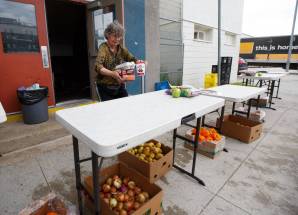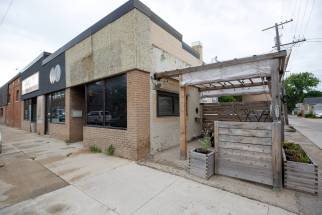Squeezed by escalating prices, more people turn to city food banks
Read this article for free:
or
Already have an account? Log in here »
To continue reading, please subscribe:
Monthly Digital Subscription
$0 for the first 4 weeks*
- Enjoy unlimited reading on winnipegfreepress.com
- Read the E-Edition, our digital replica newspaper
- Access News Break, our award-winning app
- Play interactive puzzles
*No charge for 4 weeks then price increases to the regular rate of $19.00 plus GST every four weeks. Offer available to new and qualified returning subscribers only. Cancel any time.
Monthly Digital Subscription
$4.75/week*
- Enjoy unlimited reading on winnipegfreepress.com
- Read the E-Edition, our digital replica newspaper
- Access News Break, our award-winning app
- Play interactive puzzles
*Billed as $19 plus GST every four weeks. Cancel any time.
To continue reading, please subscribe:
Add Free Press access to your Brandon Sun subscription for only an additional
$1 for the first 4 weeks*
*Your next subscription payment will increase by $1.00 and you will be charged $16.99 plus GST for four weeks. After four weeks, your payment will increase to $23.99 plus GST every four weeks.
Read unlimited articles for free today:
or
Already have an account? Log in here »
Hey there, time traveller!
This article was published 14/07/2022 (1243 days ago), so information in it may no longer be current.
Zoe Priest never thought money would be so tight that she’d have to line up for food.
On a rainy Thursday afternoon, she waited for a hamper for the first time.
“Resources are spread thinner, and thinner, and thinner, and things are just getting more expensive,” she said.
Priest has a roommate, but their collective income barely covers rent. She’s also helping a friend, who has a child, make ends meet. She had been able to help out by trimming her own budget and buying discounted groceries, but as the cost of food skyrocketed due to inflation, it became unmanageable.
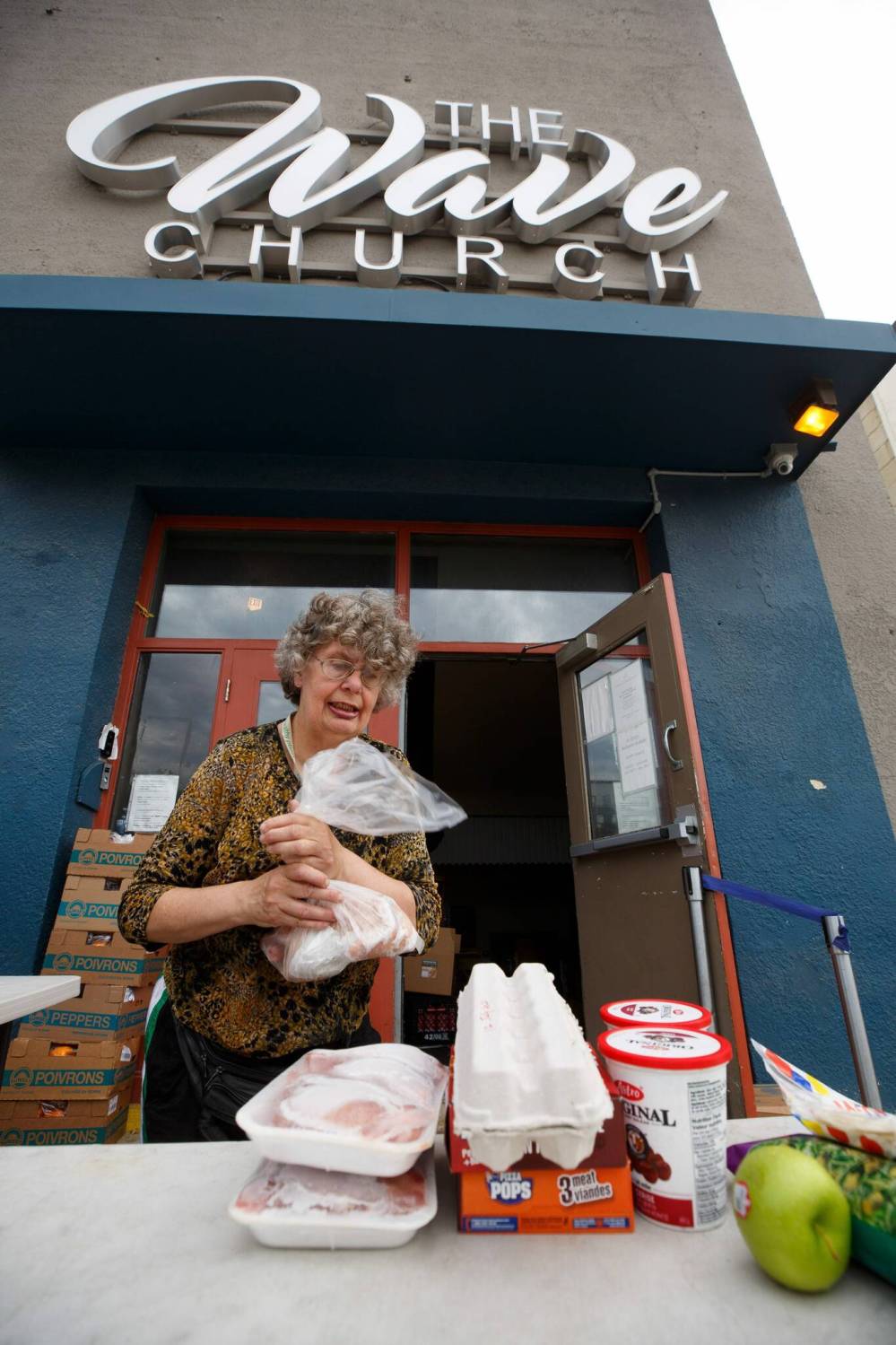
Inflation in Canada hit 7.7 per cent in May, a 39-year high.
A friend recommended Priest seek help from Agape Table, a non-profit on Furby Street that provides meals, a food bank program twice weekly and hampers to families in need.
She said she hopes the box of food has basics, baby food and supplies.
“It’s hard. I do wish I could afford to feed the family on what I do make,” she said as she waited with three dozen others.
For some, the rising cost of food has been irritating, but manageable. For many others who were just getting by, it’s made life difficult. Priest is one of them.
“I know I’ve lost a lot of weight just by making different decisions… and not being able to eat enough – just saying ‘Well, I don’t need to eat, the kid needs to eat, I don’t need to eat,” Priest said.
“I know I’ve lost a lot of weight just by making different decisions… and not being able to eat enough– just saying ‘Well, I don’t need to eat, the kid needs to eat, I don’t need to eat.” – Zoe Priest
At Agape Table, volunteers are serving more people than in the past. Executive director Jim Steep said on an average day in the past, from 270 to 320 people would receive one meal a day, but that number has spiked to 550 to 650. Some days more than 700 people show up.
“It’s people who haven’t had to use our services before,” he said.
“I mean, the people that have been using our services, that number keeps going up… but there’s an amount of people that haven’t been in this position before, they just need some help to get through.”
He expects Agape Table’s costs will jump by 30 per cent. While most of the food they hand out is donated, the cost of packing and providing that food is rising, too: from soup bowls to plastic wrap, the cost of helping others has increased.

At Siloam Mission, administrative and front-line staff have joined kitchen workers, often during their own brief breaks, as the organization deals with a steep drop in volunteers.
“I would say COVID is responsible for the vast majority of that, partly in terms of people getting sick, people not feeling safe coming back, but also it triggered a lot of life changes for people, finding other jobs, retiring, moving…,” Siloam Mission communications manager Luke Thiessen said.
While the number of volunteers has dropped, demand is back to pre-pandemic levels at 300 Princess St.: around 400 meals, three times a day.
Lighthouse Mission manager Peter McMullen said he knew inflation was taking its toll when they were forced to buy their own bread for the hundreds of sandwiches they give out every day on Main Street between Higgins and Logan avenues.
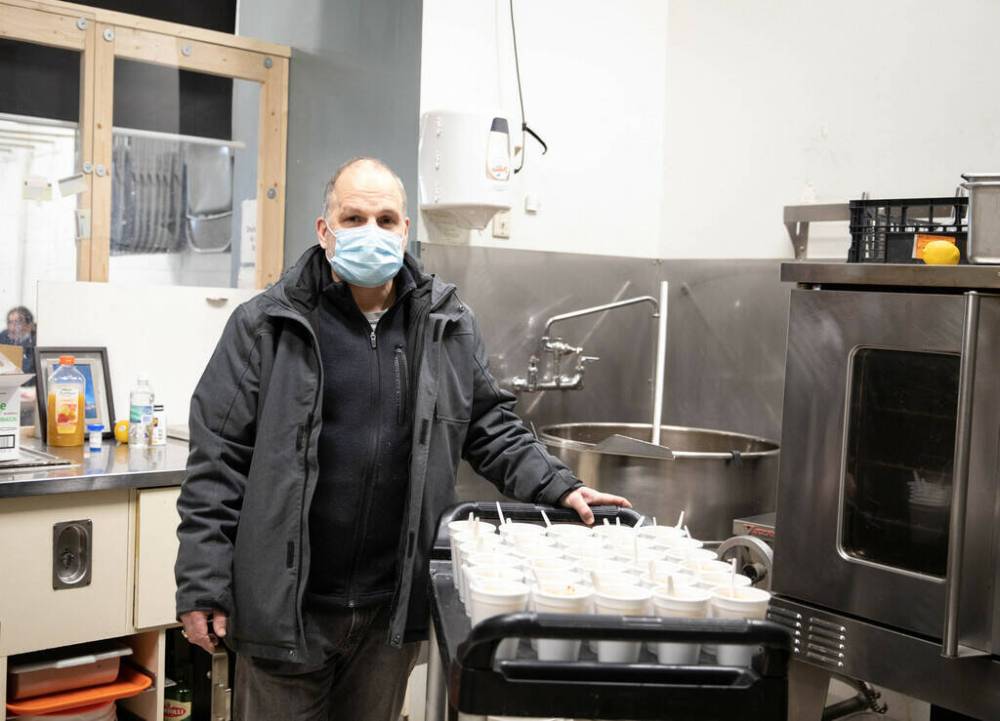
“That bread, for the most part, was donated bread. Now, all of a sudden, we’re getting zero bread,” he said.
Thousands of sandwiches weekly could add up to $20,000 to their annual budget costs, making it more difficult to provide their services, McMullen said.
As the cost of flour rises, companies that make and donate bread to organizations such as Manitoba Harvest and Main Street Project are making less bread, and giving less away. That trickles down to smaller operations like Lighthouse Mission, which still serves up to 300 breakfasts, 800 cups of coffee and 400 sandwiches every day. They run out of food well before meal times close.
“People are coming in, and they’re very desperate,” he said. “They’ll say, ‘thank you so much for your help, if I wasn’t able to get a hamper today, I would have had to look at other options.’ And some people have gone as far to say they would have had to look at stealing food.”
“People are coming in, and they’re very desperate… And some people have gone as far to say they would have had to look at stealing food.” – Peter McMullen
The higher cost of food, increased demand and fewer donations have created an “unprecedented” situation for food providers and those in need of food, Harvest Manitoba CEO Vince Barletta explained.
“These last two months, we’ve not been getting the food donated that we need to meet the demand. We’ve been going out and buying it,” he said.
Demand is up about 40 per cent at Harvest Manitoba, which is slightly higher but similar to numbers across the country, Barletta said. It means about 14,000 households received a hamper from the organization in the last month, compared with 10,000 the same month last year.
He doesn’t see it ending as long as inflation continues to soar.
“I wish I had better news for you, but so long as prices continue to rise and people’s income doesn’t keep pace, we’re going to see more and more households squeezed, and more and more people end up needing Harvest and needing food banks to get by.”
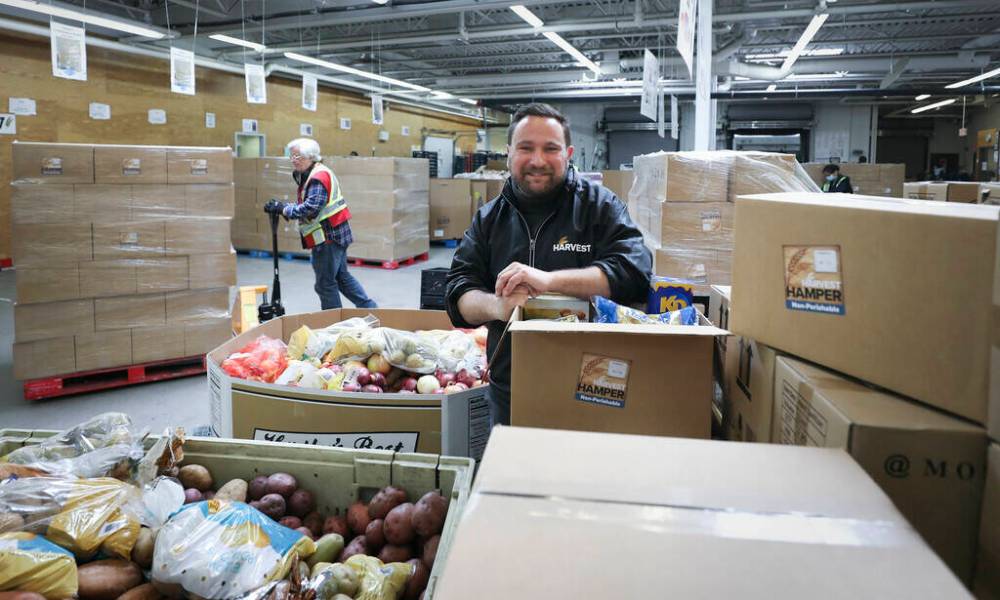
Rural Manitoba is facing a unique level of food need, Barletta said, particularly in Thompson, which lost its Salvation Army food bank in May.
The solution must involve structures are in place to provide vulnerable people with income support to weather economic downturns.
“It can’t just be hampers, it has to be hope. That means employment training, that means economic development, but it also means that for some individuals on disability, for seniors and other vulnerable individuals, there needs to be further income support that’s going to let people keep pace with rising prices.”
Every organization the Free Press spoke to said donations are sorely needed.
“We need funds, we need food, and we need volunteers,” Barletta said.
malak.abas@freepress.mb.ca

Our newsroom depends on a growing audience of readers to power our journalism. If you are not a paid reader, please consider becoming a subscriber.
Our newsroom depends on its audience of readers to power our journalism. Thank you for your support.







